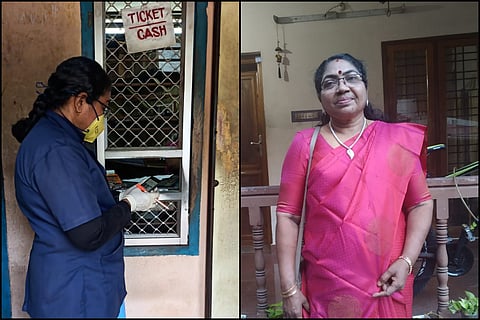

In her schooldays, Suma PS heard her Math teacher ask a student if he had ‘a conductor’s memory’. The boy had forgotten a lesson all too soon. Bus conductors, Suma knew, are known to have an exemplary memory of the passengers – where they need to get down, how much fare they paid and who was waiting for balance money. But once the passenger got down, the person was forgotten about; there’d be too many new faces to remember.
Years later, when she joined as the first female bus conductor with the Kerala State Road Transport Corporation (Kerala RTC) in Thiruvananthapuram, Suma realised her Math teacher was right. After six days of training in July 1992, Suma and nine other women began their work as bus conductors. She doesn’t remember the first person she gave the ticket to.
But, 28 years later, as she is about to retire from service, Suma still remembers the words of the then Transport Minister Balakrishna Pillai. “He said that if you leave this job and go, then other women will not opt for it; but if you stick on, there will be a new job sector opened for women. Those words he said really had an impact. I stayed on all these years, and three of the other women who joined with me did too,” Suma says.
Newspaper cutting of Indian Express report on women conductors starting work in Kerala
On May 20, Suma got on a bus from East Fort to serve as a conductor for the last time. It was the first day the Kerala RTC was resuming services after the COVID-19 lockdown. But Suma will be retiring on May 31 and be on leave until then. “This is the date that one knows of, from the first day of work. I have always known when I would retire and have been prepared for it. I don’t feel bad about it,” she says.
Back in 1992, she was excited about her new job, about working in a sector that women in Kerala had not worked in. There was a clause in the Public Service Commission notification that women could not apply for the post of a conductor.
“But that year, it was suggested that there will be direct appointment of women to the Kerala RTC, after a test and interview. Three hundred women were selected after the test. I got the first rank. Then there was an interview with the managing director and the executive directors. Ten of us cleared it. We had training at the staff training college in Pappanamcode (Thiruvananthapuram), with the likes of Sreelekha IPS,” Suma says, with her 'conductor memory' that hasn’t faded in the years that passed.
On July 4, 1992, Minister Balakrishna Pillai inaugurated the entry of women into the field by giving away a ticket rack to Suma at the Secretariat Hall in Thiruvananthapuram. “I met Transport Secretary Gopinathan Nair, the late father of actor Mohanlal. He told me that he had studied with my father in Pathanamthitta,” she says.
Kaumudi report of Suma getting the first ticket rack from Minister Balakrishna Pillai in 1992
It became a historic event. The Public Service Commission had to remove the clause restricting women from applying for the post of a conductor, in 1994. Hundreds followed in the footsteps of Suma and the others.
Suma needed no precedents. She says she had a certain liking for doing things not done before. By 1992, she had finished her Masters in Commerce and got married, too. Everyone in her family was supportive of her choice of job. The people in the bus, too, Suma remembers, were encouraging.
“That first day, I was on the bus to Vallakkadavu. It was full of common people – going to the market or their jobs. When they saw all the media persons and the police, they realised that a female conductor had begun working. I will never forget how supportive they were. I went on that route for nine months before switching over to a double-decker to Sasthamangalam.”
None of the passengers had ever misbehaved with her but she has been a witness to many unfortunate incidents on the bus. She remembers shouting at a man and throwing him out of the bus after he misbehaved with a child. “Some parents send their children to school on the bus. I had taken this little girl in and put her safely inside. Later, this man put her on his lap and from the look on her face, I understood she was uncomfortable. I took her away and shouted at him. He claimed he is a retired police officer. I said I was not afraid of a lion with teeth, then why would I be of one who has lost his teeth.”
There have been breakdowns and accidents, too. In 1997, when Suma was pregnant with her second child, the bus had an accident at Maruthamkuzhi. Ignoring her minor bruises, she started helping the injured passengers into the army trucks that came to take them to hospitals.
Suma with her family
They are trained for it, and conductors have to hold on, no matter how bumpy the ride gets. Holding on became a habit for Suma. There were years in between when she did desk work at Kerala RTC, but in 2019, she got back on a bus, accepting the change happily, eagerly. Even now, as she retires, she is looking forward to doing something entirely different to keep her engaged, that spirit for doing new things not fading one bit. Prodding her on is her supportive family of three – husband K Gopi, son Gautham, and daughter Gayathri.